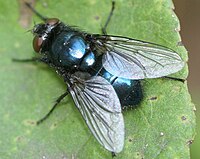
Photo from wikipedia
The genetic basis of antiviral immunity in dipteran insects is extensively studied in Drosophila melanogaster and advanced technologies for genetic manipulation allow a better characterization of immune responses also in… Click to show full abstract
The genetic basis of antiviral immunity in dipteran insects is extensively studied in Drosophila melanogaster and advanced technologies for genetic manipulation allow a better characterization of immune responses also in non-model insect species. Especially, immunity in vector mosquitoes is recently in the spotlight, due to the medical impact that these insects have by transmitting viruses and other pathogens. Here, we review the current state of experimental evidence that supports antiviral functions for immune genes acting in different cellular pathways. We discuss the well-characterized RNA interference mechanism along with the less well-defined JAK-STAT, Toll and IMD signaling pathways. Furthermore, we highlight the initial evidence for antiviral activity observed for the autophagy pathway, transcriptional pausing, as well as piRNA production from endogenous viral elements. We focus our review on studies from Drosophila, and mosquito species from the lineages Aedes, Culex and Anopheles, which contain major vector species responsible for virus transmission.
Journal Title: Developmental and comparative immunology
Year Published: 2021
Link to full text (if available)
Share on Social Media: Sign Up to like & get
recommendations!